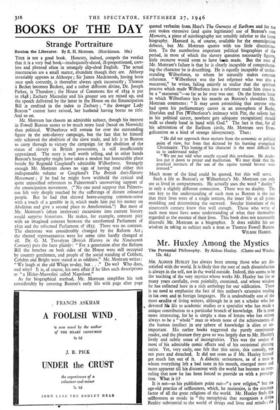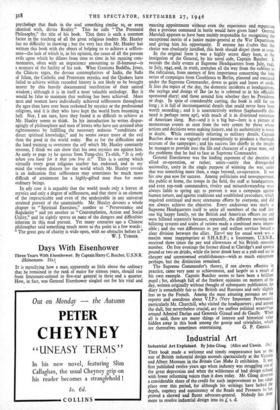Mr. Huxley Among the. Mystics
The Perennial Philosophy. By Aldous Huxley. (Chatto and Windus. 12s. 6d.) ' MR. ALDOUS HUXLEY has always been among those who are dis- satisfied with the world. It is likely that the root of such dissatisfaction is always in the self, not in the world outside. Indeed, this seems to be the teaching of the very mystics whose works Mr. Huxley has for so many years carefully, even painfully, examined, and whose wisdom he has collected here in a rich anthology for our edification. There is no need to emphasise the fact of this authors's extensive reading in his own and in foreign languages. He is undoubtedly one of the most erudite of living writers, although he is not a scholar who has devoted his life to academic studies or a specialist who has made a unique contribution to a particular branch of knowledge. He is even more interesting, for he is simply a man of letters who has striven always to be a " whole " man to whom none of the achievements of the human intellect in any sphere of knowledge is alien or un- important His earlier books suggested the purely omnivorous reader, and the pleasure they gave us was largely due to Mr. Huxley's lively and subtle sense of incongruities. This was the source of most of his admirable comic effects and of his occasional piercing satire. Yet, very early, one felt that this satire, this comedy, wit not pure and detached. It did not seem as if Mr. Huxley himself got much fun out of it. A didactic seriousness, as of a man to whom everything left a bad taste in his mouth, emerged more and more apparent till his discontent with the world has become so over- ruling that now he has been forced to provide us with a prescrip- tion. What is it?
It is not—as his publishers point out—" a new religion," but the age-old practice of selflessness, which, he maintains, is the common factor of all the great religions of the world. Mr. Huxley finds this selflessness to reside in " the metaphysic that recognises a divine Reality substantial to the world of things and lives and minds : the
psychology that finds in the soul something similar to, or even identical with, divine Reality." This he calls " The Perennial Philosophy," the title of his book. That there is such a common factor in the teaching of all the great religious leaders Mr. Huxley
has no difficulty in showing; the very fact that Mr. Huxley has written this book with the oject of helping us to achieve a selfless- ness—the lack of which is, in his opinion, the cause of all the present evils upon which he dilates from time to time in his rapping com- mentaries, often with an impatience amounting to ill-humour—is a measure of the futility of his task. What Gautama Buddha, Jesus, the Chinese sages, the devout contemplatives of India, the Sufis of Islam, the Catholic and Protestant mystics and the Quakers have failed to achieve within recorded history is not likely to be brought nearer by this heavily documented recollection of their united' wisdom • although it is in itself a most valuable anthology. But it would be false to maintain that nothing has been achieved. More men and women have individually achieved selflessness throughout the ages than have ever been reckoned by mystics or the professional religions, and it is they who have kept the world from becoming a hell. Nor, I am sure, have they found it as difficult to achieve as Mr. Huxley seems to think. In his introduction he writes dispar- agingly of philosophers and men of letters who have not strained after righteousness by fulfilling the necessary arduous "conditions of direct spiritual knowledge," and he seems aware more of the evil than the good in the world today. But as for the difficulties and the hard training to overcome the self which Mr. Huxley constantly stresses, I think we can show that his own mystics are against him. As early as page 15 he quotes from Yung-cilia Ta-shih, "It is only when you hunt for it that you lose it." This is a saying which virtually every great religious teacher has endorsed, and to my mind the violent distaste for the world which Mr. Huxley reveals is an indication that selflessness may sometimes be much more difficult of attainment for a highly-gifted man than for more ordinary beings.
In axiy case it is arguable that the world needs only a leaven of mystics and only a degree of selflessness, and that there is an element of the impracticable and even of the undesirable in any universal strained pursuit of the unattainable. Mr. Huxley devotes a whole chapter to " Spiritual Exercises," another to " Perseverance and Regularity " and yet another to " Contemplation, Action and Social Utility," and he rightly spares us none of the dangers and difficulties inherent in this mad pursuit. Yet many centuries ago a Chinese philosopher said something much more to the point in a few words: " The great gate of charity is wide open, with no obstacles before it."
W. J. TURNER.



























 Previous page
Previous page